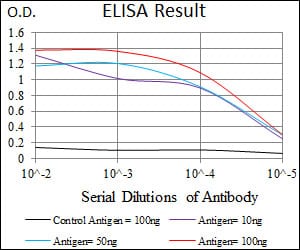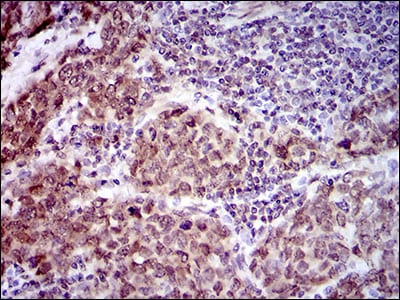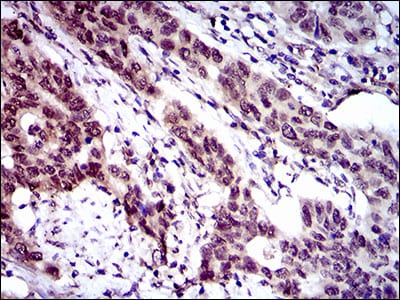


| WB | 1/500 - 1/2000 | Human,Mouse,Rat |
| IF | 咨询技术 | Human,Mouse,Rat |
| IHC | 1/200 - 1/1000 | Human,Mouse,Rat |
| ICC | 技术咨询 | Human,Mouse,Rat |
| FCM | 咨询技术 | Human,Mouse,Rat |
| Elisa | 1/10000 | Human,Mouse,Rat |
| Entrez GeneID | 1047 |
| clone | 9C8G10 |
| WB Predicted band size | 70kDa |
| Host/Isotype | Mouse IgG1 |
| Antibody Type | Primary antibody |
| Storage | Store at 4°C short term. Aliquot and store at -20°C long term. Avoid freeze/thaw cycles. |
| Species Reactivity | Human |
| Immunogen | Purified recombinant fragment of human CLGN (AA: 249-405) expressed in E. Coli. |
| Formulation | Purified antibody in PBS with 0.05% sodium azide |
+ +
以下是3篇涉及CLGN(Calmegin)抗体的相关文献及摘要概括:
---
1. **文献名称**: *"Calmegin is required for sperm motility and male fertility in mice"*
**作者**: Ikawa M. et al.
**摘要**: 该研究通过基因敲除小鼠模型证实CLGN在精子运动能力中的关键作用,利用特异性抗体检测到CLGN缺失导致精子形态异常和生育力下降,揭示了其在精子成熟中的分子机制。
---
2. **文献名称**: *"Role of Calmegin in intercellular adhesion during spermatogenesis"*
**作者**: Nakamura S. et al.
**摘要**: 研究通过免疫荧光和Western blot分析CLGN抗体标记的蛋白定位,发现CLGN参与精子细胞间黏附,并调控减数分裂过程中生殖细胞的信号通路。
---
3. **文献名称**: *"Autoantibodies against Calmegin in male infertility: diagnostic potential and functional implications"*
**作者**: Tanaka H. et al.
**摘要**: 首次报道CLGN抗体在部分男性不育患者血清中的异常表达,提出其可能通过干扰精子-卵子结合导致不孕,提示CLGN抗体可作为临床诊断的生物标志物。
---
注:若需获取具体文献,建议通过PubMed或SciHub输入标题/作者检索全文。部分研究可能涉及CLGN抗体的开发或应用拓展。
CLGN (Calmegin) antibody is a research tool used to study the expression and function of calmegin, a testis-specific protein belonging to the chaperone family. Calmegen, encoded by the CLGN gene, is predominantly expressed during spermatogenesis and plays a critical role in male fertility. It functions as a molecular chaperone in the endoplasmic reticulum, assisting in the proper folding of proteins essential for sperm maturation, including those involved in sperm-egg adhesion. Studies in CLGN-deficient mice have demonstrated its necessity for sperm quality, as knockout models exhibit impaired sperm motility and infertility.
CLGN antibodies are widely utilized in reproductive biology research to investigate mechanisms underlying male infertility, protein quality control in germ cells, and molecular interactions during fertilization. These antibodies enable detection of calmegin expression via techniques like Western blotting, immunohistochemistry, and immunofluorescence. Additionally, they contribute to exploring CLGN's potential roles beyond reproduction, such as its debated expression in certain cancer cells and autoimmune contexts. Recent studies also highlight its involvement in regulating testicular immune privilege, linking CLGN to immunological aspects of reproductive health. As a target for both basic and clinical research, CLGN antibodies remain pivotal in advancing understanding of gamete biology and associated pathologies.
×